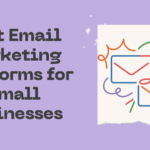Running a small business presents a unique set of challenges. The list of tasks can seem to go on forever, from keeping track of funds and client relationships to overseeing projects and stock. Luckily, these methods can be improved with the right programming, making your business activities more compelling. In this article, we will explore the best small business management software available in 2024 to assist you with pursuing an educated choice that will help you develop and turn out to be more useful.
Software for small businesses includes a variety of tools for managing various aspects of business operations. Whether it’s bookkeeping, client relationships with the board (CRM), project executives, or stock control, these product arrangements are customized to meet the interesting necessities of independent companies. In 2024, the market is overwhelmed with various choices, each offering particular highlights and advantages. The best independent company the board programming smooths out day-to-day errands as well as gives bits of knowledge that can drive key choices.
Table of Contents
Benefits of Using Small Business Management Software
Before we get into our top choices, let’s briefly talk about the main advantages of using the best small business management software:
Further developed Effectiveness: Robotizes routine undertakings, saving time for additional essential exercises.
Improved Decision Making: Provides analytics and data in real-time to help businesses make better decisions.
Upgraded Joint effort: Works with correspondence and cooperation among colleagues.
Adaptability: Develops with your business, offering highlights that help growing tasks.
Cost Saving: Reduces the need for multiple independent tools, resulting in lower overall costs.
Criteria for Choosing the Best Small Business Management Software

Selecting the best small business management software involves considering several factors:
- Convenience: The product ought to have a natural point of interaction that is not difficult to explore.
- Features and Functionality: It should cover essential business functions like accounting, CRM, project management, and more.
- Integration: The ability to integrate with other tools and platforms you already use is crucial.
- Scalability: As your business grows, the software should be able to accommodate increased demands.
- Cost: It should offer good value for money, with pricing that fits your budget.
- Support for Customers: For assistance and troubleshooting, dependable customer support is essential.
With these criteria in mind, let’s explore the top choices for best small business management software in 2024.
Top Choices for Best Small Business Management Software in 2024
1. QuickBooks Online
QuickBooks Online remains a favorite among small businesses for its robust accounting features. It offers a comprehensive suite of tools for managing finances, including invoicing, expense tracking, payroll, and tax preparation.
Key Features:
- Automated bank feeds and reconciliations
- Customizable invoices and payment reminders
- Payroll processing with tax calculations
- Financial reporting and dashboards
- Integration with hundreds of third-party apps
Pros:
- User-friendly interface
- Extensive feature set tailored for small businesses
- Strong integration capabilities
Cons:
- Higher pricing tiers for advanced features
2. Xero
Xero is another powerful accounting software that’s gaining popularity among small businesses. It offers a wide range of features for managing financial transactions, from invoicing to bank reconciliation.
Key Features:
- Real-time bank reconciliation
- Customizable invoices and quotes
- Expense tracking and receipt management
- Comprehensive financial reports
- Integration with over 800 business apps
Pros:
- Easy to use and navigate
- Excellent customer support
- Strong emphasis on automation
Cons:
- Limited inventory management features
3. FreshBooks
FreshBooks is known for its user-friendly interface and strong invoicing capabilities. It’s ideal for freelancers and small businesses that need a straightforward solution for managing finances.
Key Features:
- Professional invoicing with automatic reminders
- Expense tracking and categorization
- Time tracking for billable hours
- Financial reporting and insights
- Integration with a variety of apps and platforms
Pros:
- Intuitive and easy to use
- Excellent invoicing and payment tracking features
- Affordable pricing
Cons:
- Limited advanced accounting features
4. Zoho CRM
Zoho CRM is a versatile CRM solution that helps small businesses manage customer relationships and sales processes. It’s part of the larger Zoho suite, which includes tools for everything from marketing to project management.
Key Features:
- Sales automation and pipeline management
- Contact and lead management
- Email marketing and campaigns
- Reporting and analytics
- Reconciliation with other Zoho applications and outsider devices
Pros:
- Highly customizable
- Wide range of features
- Affordable pricing
Cons:
- Can be complex to set up initially
5. HubSpot CRM
HubSpot CRM offers a free, robust CRM platform that’s perfect for small businesses. It includes a range of tools to manage contacts, track deals, and automate marketing efforts.
Key Features:
- Contact and lead management
- Deal tracking and sales pipeline management
- Email marketing and automation
- Reporting and analytics
- Integration with HubSpot’s marketing, sales, and service hubs
Pros:
- Completely free for basic features
- Easy to use and set up
- Strong integration capabilities
Cons:
- Advanced features require paid plans
6. Trello
Trello is a simple, visual project management tool that uses boards, lists, and cards to help teams organize tasks and projects. It’s ideal for small businesses that need a straightforward way to manage their workflow.
Key Features:
- Visual task boards and lists
- Customizable cards with due dates, attachments, and comments
- Collaboration tools for team members
- Integration with various apps and tools
- Mobile app for on-the-go management
Pros:
- Very easy to use
- Flexible and customizable
- Free plan available
Cons:
- Limited advanced project management features
7. Asana
Asana is a comprehensive project management tool that helps teams track work and manage projects. It offers a wide range of features to support collaboration and productivity.
Key Features:
- Task and project tracking
- Timeline and calendar views
- Collaboration tools, including comments and file attachments
- Reporting and analytics
- Integration with over 100 apps and services
Pros:
- Powerful project management features
- Highly customizable
- Strong integration capabilities
Cons:
- Can be overwhelming for new users
8. Monday.com
Monday.com is a flexible work operating system that allows teams to manage projects, tasks, and workflows. It’s designed to be highly customizable to fit the needs of any business.
Key Features:
- Visual project and task boards
- Customizable workflows and automation
- Time tracking and resource management
- Collaboration tools and communication features
- Integration with various apps and platforms
Pros:
- Very flexible and customizable
- Strong collaboration features
- User-friendly interface
Cons:
- Higher pricing tiers for advanced features
9. TradeGecko (QuickBooks Commerce)
TradeGecko, now part of QuickBooks Commerce, helps small businesses manage inventory, orders, and customers across multiple sales channels. It’s ideal for businesses with complex inventory needs.
Key Features:
- Inventory tracking and management
- Order and fulfillment management
- Multi-channel sales integration
- Reporting and analytics
- Integration with QuickBooks Online and other tools
Pros:
- Strong inventory management features
- Integration with QuickBooks Online
- Supports multi-channel sales
Cons:
- Can be expensive for smaller businesses
10. Cin7
Cin7 is an inventory and order management software with extensive integrations and automation features. It’s designed for businesses with complex inventory needs and multiple sales channels.
Key Features:
- Inventory tracking and control
- Order management and fulfillment
- Warehouse management
- Reporting and analytics
- Integration with various sales channels and business apps
Pros:
- Comprehensive inventory management features
- Strong automation capabilities
- Wide range of integrations
Cons:
- Higher pricing for advanced features
11. Zoho Inventory
Zoho Inventory is part of the Zoho suite and offers robust inventory management features. It’s ideal for small businesses that need a cost-effective solution for managing stock and orders.
Key Features:
- Inventory tracking and control
- Order and shipment management
- Multi-channel sales integration
- Reporting and analytics
- Reconciliation with other Zoho applications and outsider devices
Pros:
- Affordable pricing
- Strong integration with Zoho suite
- Easy to use
Cons:
- Limited advanced features
12. Odoo
Odoo is an open-source suite of business applications that includes tools for CRM, eCommerce, accounting, inventory, and project management. It’s highly customizable and scalable, making it a great choice for growing businesses.
Key Features:
- Comprehensive suite of business applications
- Customizable workflows and processes
- Integrated CRM, accounting, and inventory management
- Reporting and analytics
- Open-source and scalable
Pros:
- Very flexible and customizable
- Wide range of integrated tools
- Open-source with strong community support
Cons:
- Can be complex to set up and configure
13. Zoho One
Zoho One is a comprehensive suite of over 40 integrated business applications covering everything from sales and marketing to accounting and HR. It’s an all-in-one solution for small businesses looking to streamline operations.
Key Features:
- Integrated suite of business applications
- CRM, marketing, accounting, HR, and more
- Customizable workflows and automation
- Reporting and analytics
- Integration with third-party apps
Pros:
- Comprehensive all-in-one solution
- Strong integration within the Zoho ecosystem
- Affordable pricing for the complete suite
- Customizable to fit various business needs
Cons:
- Can be overwhelming due to the sheer number of applications
- Requires time to fully implement and utilize all features
14. Wave
Wave is a free accounting software with additional features for invoicing and receipt scanning. It’s an excellent choice for small businesses and freelancers who need basic accounting tools without a hefty price tag.
Key Features:
- Free accounting software
- Invoicing and payment processing
- Receipt scanning and expense tracking
- Financial reporting and dashboards
- Integration with various payment processors
Pros:
- Completely free for core features
- User-friendly interface
- Strong invoicing and payment features
Cons:
- Limited advanced accounting features
- Customer support can be slow
15. Gusto
Gusto is a full-service payroll and HR platform that handles payroll, benefits, and compliance. It’s ideal for small businesses that need to manage employee-related processes efficiently.
Key Features:
- Full-service payroll processing
- Employee benefits administration
- Compliance and tax filings
- Time tracking and PTO management
- Employee onboarding and self-service
Pros:
- Comprehensive HR and payroll features
- Easy to use
- Strong customer support
Cons:
- Higher pricing for advanced features
- Limited integrations compared to some competitors
16. BambooHR
BambooHR is an HR programming arrangement intended for small and medium-sized organizations. It helps manage employee data, recruiting, and performance, making HR tasks more efficient.
Key Features:
- Employee database and records
- Applicant tracking and recruiting
- Performance management and reviews
- Time tracking and PTO management
- Reporting and analytics
Pros:
- User-friendly interface
- Comprehensive HR features
- Strong customer support
Cons:
- Can be expensive for smaller businesses
- Limited payroll features
17. Zenefits
Zenefits is an integrated HR solution that offers payroll, benefits, and time-tracking features. It’s designed to simplify HR processes and improve employee management.
Key Features:
- Payroll processing and tax filings
- Benefits administration and compliance
- Time tracking and scheduling
- Employee self-service portal
- Reporting and analytics
Pros:
- Comprehensive HR and payroll features
- Easy to use
- Strong integration capabilities
Cons:
- Higher pricing for advanced features
- Customer support can be slow
18. Slack
Slack is a popular messaging app for teams that integrates with many other business tools. It’s ideal for small businesses that need a reliable communication platform to enhance collaboration.
Key Features:
- Real-time messaging and file sharing
- Channels for organized conversations
- Integration with numerous apps and services
- Searchable message history
- Mobile app for on-the-go communication
Pros:
- Easy to use and set up
- Flexible and customizable
- Free plan available
Cons:
- Limited advanced project management features
19. Microsoft 365
Microsoft 365 offers a suite of productivity tools, including Word, Excel, PowerPoint, and Teams, that are essential for small businesses. It’s a comprehensive solution for managing documents, communication, and collaboration.
Key Features:
- A suite of productivity applications
- Cloud storage with OneDrive
- Email and calendar with Outlook
- Communication and Collaboration with Teams
- Security and compliance features
Pros:
- Widely used and trusted
- Seamless integration across applications
- Strong security features
Cons:
- Can be expensive for smaller businesses
- The learning curve for new users
20. Google Workspace
Google Workspace (formerly G Suite) offers a suite of cloud-based productivity tools, including Gmail, Docs, Drive, and Meet. It’s ideal for small businesses looking for a reliable and affordable solution for communication and collaboration.
Key Features:
- A suite of cloud-based productivity applications
- Email with Gmail
- Document creation and collaboration with Docs and Sheets
- Cloud storage with Drive
- Video conferencing with Meet
Pros:
- Easy to use and set up
- Affordable pricing
- Strong collaboration features
Cons:
- Limited offline capabilities
- Less advanced features compared to Microsoft 365
FAQs
What is small business management software?
Why do small businesses need management software?
How do I choose the best small business management software?
Is small business management software expensive?
Can small business management software integrate with other tools?
What are the benefits of using cloud-based management software?
Can I switch management software if my business outgrows the current one?
Conclusion
By choosing the best small business management software that fits your specific needs, you can streamline your operations, improve efficiency, and focus on growing your business. Whether you need robust accounting tools, effective CRM solutions, or comprehensive project management systems, there’s a software option out there to help you succeed in 2024 and beyond.
You can explore our website for more articles.










